Professional Environment Case Study 2022
VerifiedAdded on 2022/10/17
|5
|1233
|22
AI Summary
Contribute Materials
Your contribution can guide someone’s learning journey. Share your
documents today.
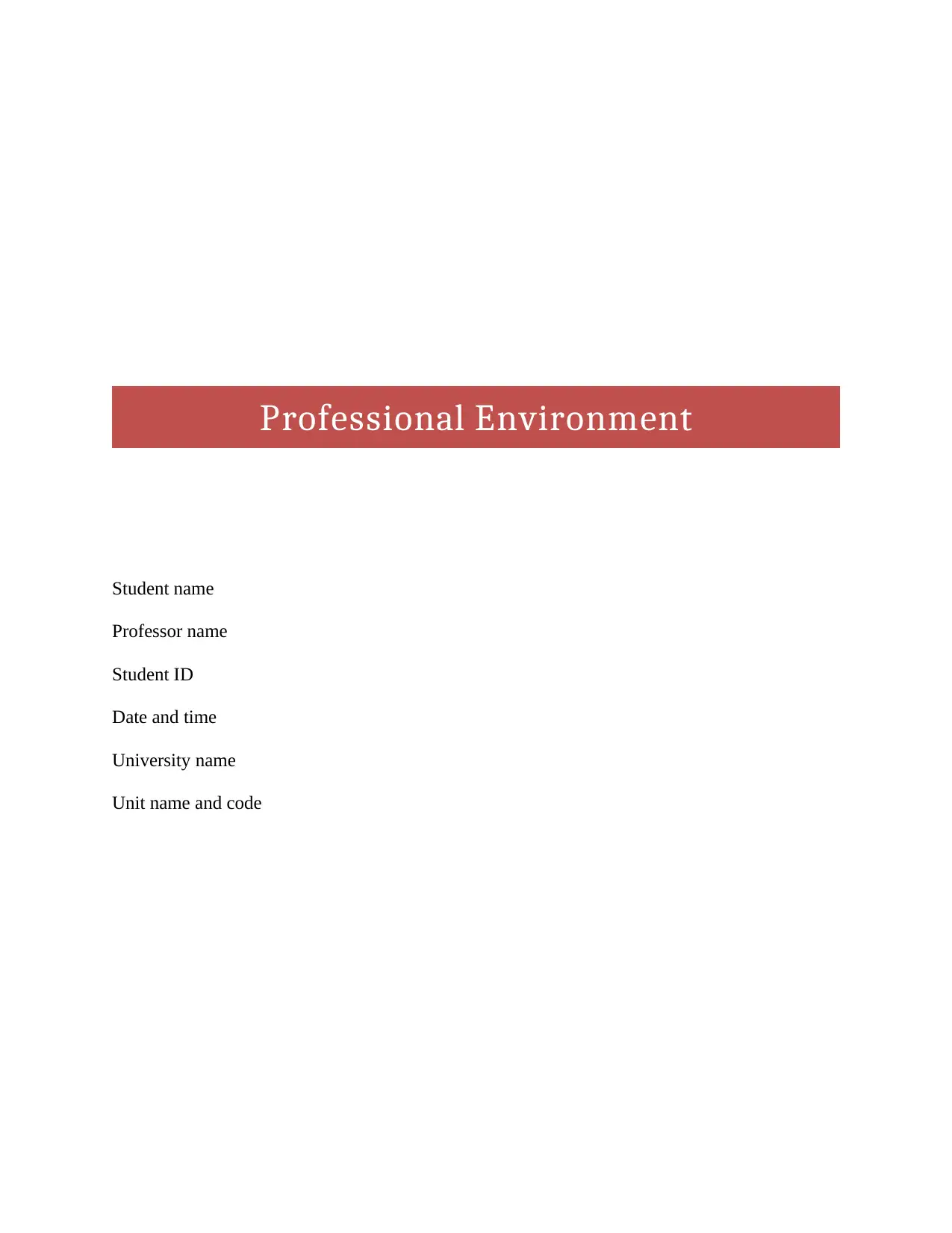
Professional Environment
Student name
Professor name
Student ID
Date and time
University name
Unit name and code
Student name
Professor name
Student ID
Date and time
University name
Unit name and code
Secure Best Marks with AI Grader
Need help grading? Try our AI Grader for instant feedback on your assignments.
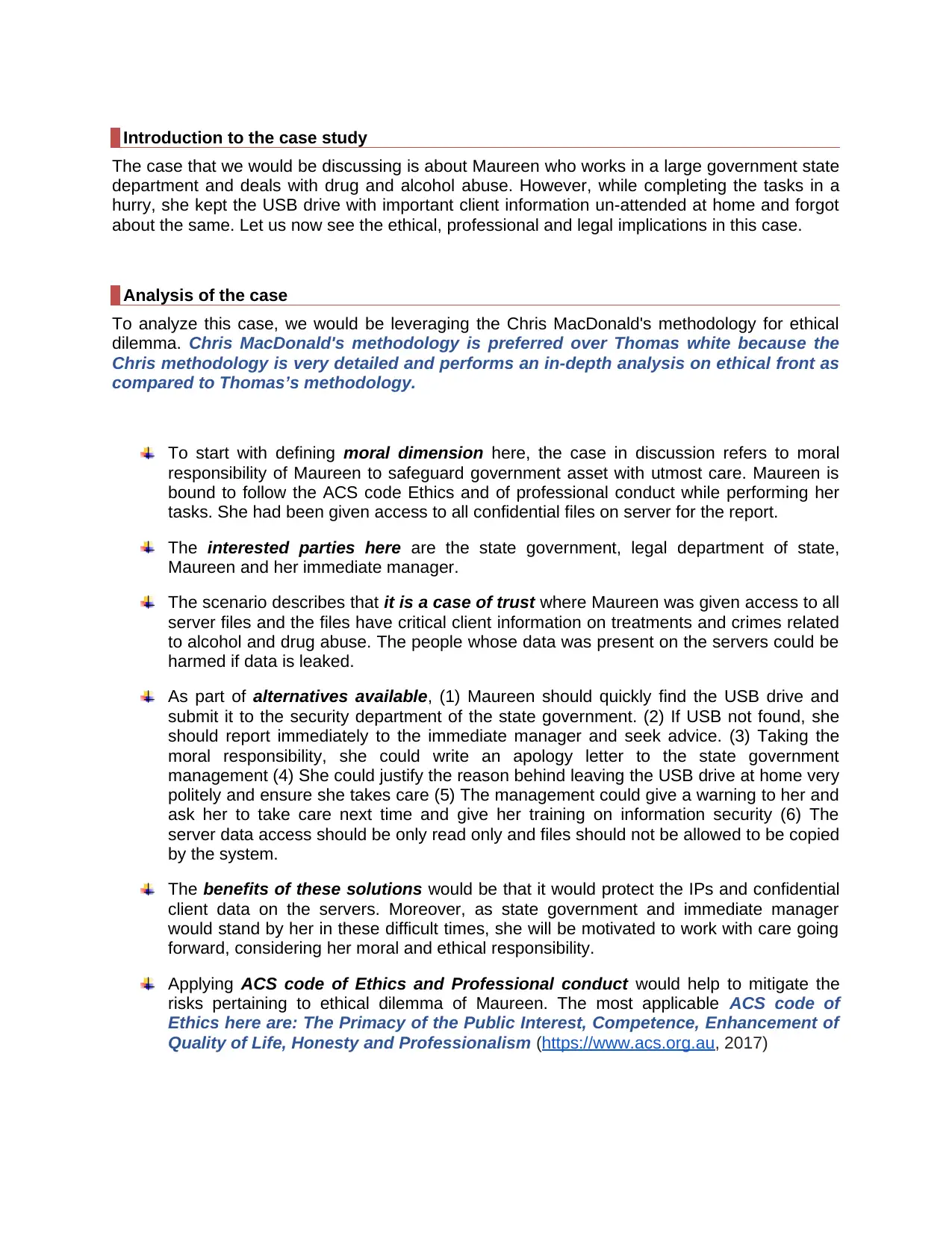
Introduction to the case study
The case that we would be discussing is about Maureen who works in a large government state
department and deals with drug and alcohol abuse. However, while completing the tasks in a
hurry, she kept the USB drive with important client information un-attended at home and forgot
about the same. Let us now see the ethical, professional and legal implications in this case.
Analysis of the case
To analyze this case, we would be leveraging the Chris MacDonald's methodology for ethical
dilemma. Chris MacDonald's methodology is preferred over Thomas white because the
Chris methodology is very detailed and performs an in-depth analysis on ethical front as
compared to Thomas’s methodology.
To start with defining moral dimension here, the case in discussion refers to moral
responsibility of Maureen to safeguard government asset with utmost care. Maureen is
bound to follow the ACS code Ethics and of professional conduct while performing her
tasks. She had been given access to all confidential files on server for the report.
The interested parties here are the state government, legal department of state,
Maureen and her immediate manager.
The scenario describes that it is a case of trust where Maureen was given access to all
server files and the files have critical client information on treatments and crimes related
to alcohol and drug abuse. The people whose data was present on the servers could be
harmed if data is leaked.
As part of alternatives available, (1) Maureen should quickly find the USB drive and
submit it to the security department of the state government. (2) If USB not found, she
should report immediately to the immediate manager and seek advice. (3) Taking the
moral responsibility, she could write an apology letter to the state government
management (4) She could justify the reason behind leaving the USB drive at home very
politely and ensure she takes care (5) The management could give a warning to her and
ask her to take care next time and give her training on information security (6) The
server data access should be only read only and files should not be allowed to be copied
by the system.
The benefits of these solutions would be that it would protect the IPs and confidential
client data on the servers. Moreover, as state government and immediate manager
would stand by her in these difficult times, she will be motivated to work with care going
forward, considering her moral and ethical responsibility.
Applying ACS code of Ethics and Professional conduct would help to mitigate the
risks pertaining to ethical dilemma of Maureen. The most applicable ACS code of
Ethics here are: The Primacy of the Public Interest, Competence, Enhancement of
Quality of Life, Honesty and Professionalism (https://www.acs.org.au, 2017)
The case that we would be discussing is about Maureen who works in a large government state
department and deals with drug and alcohol abuse. However, while completing the tasks in a
hurry, she kept the USB drive with important client information un-attended at home and forgot
about the same. Let us now see the ethical, professional and legal implications in this case.
Analysis of the case
To analyze this case, we would be leveraging the Chris MacDonald's methodology for ethical
dilemma. Chris MacDonald's methodology is preferred over Thomas white because the
Chris methodology is very detailed and performs an in-depth analysis on ethical front as
compared to Thomas’s methodology.
To start with defining moral dimension here, the case in discussion refers to moral
responsibility of Maureen to safeguard government asset with utmost care. Maureen is
bound to follow the ACS code Ethics and of professional conduct while performing her
tasks. She had been given access to all confidential files on server for the report.
The interested parties here are the state government, legal department of state,
Maureen and her immediate manager.
The scenario describes that it is a case of trust where Maureen was given access to all
server files and the files have critical client information on treatments and crimes related
to alcohol and drug abuse. The people whose data was present on the servers could be
harmed if data is leaked.
As part of alternatives available, (1) Maureen should quickly find the USB drive and
submit it to the security department of the state government. (2) If USB not found, she
should report immediately to the immediate manager and seek advice. (3) Taking the
moral responsibility, she could write an apology letter to the state government
management (4) She could justify the reason behind leaving the USB drive at home very
politely and ensure she takes care (5) The management could give a warning to her and
ask her to take care next time and give her training on information security (6) The
server data access should be only read only and files should not be allowed to be copied
by the system.
The benefits of these solutions would be that it would protect the IPs and confidential
client data on the servers. Moreover, as state government and immediate manager
would stand by her in these difficult times, she will be motivated to work with care going
forward, considering her moral and ethical responsibility.
Applying ACS code of Ethics and Professional conduct would help to mitigate the
risks pertaining to ethical dilemma of Maureen. The most applicable ACS code of
Ethics here are: The Primacy of the Public Interest, Competence, Enhancement of
Quality of Life, Honesty and Professionalism (https://www.acs.org.au, 2017)
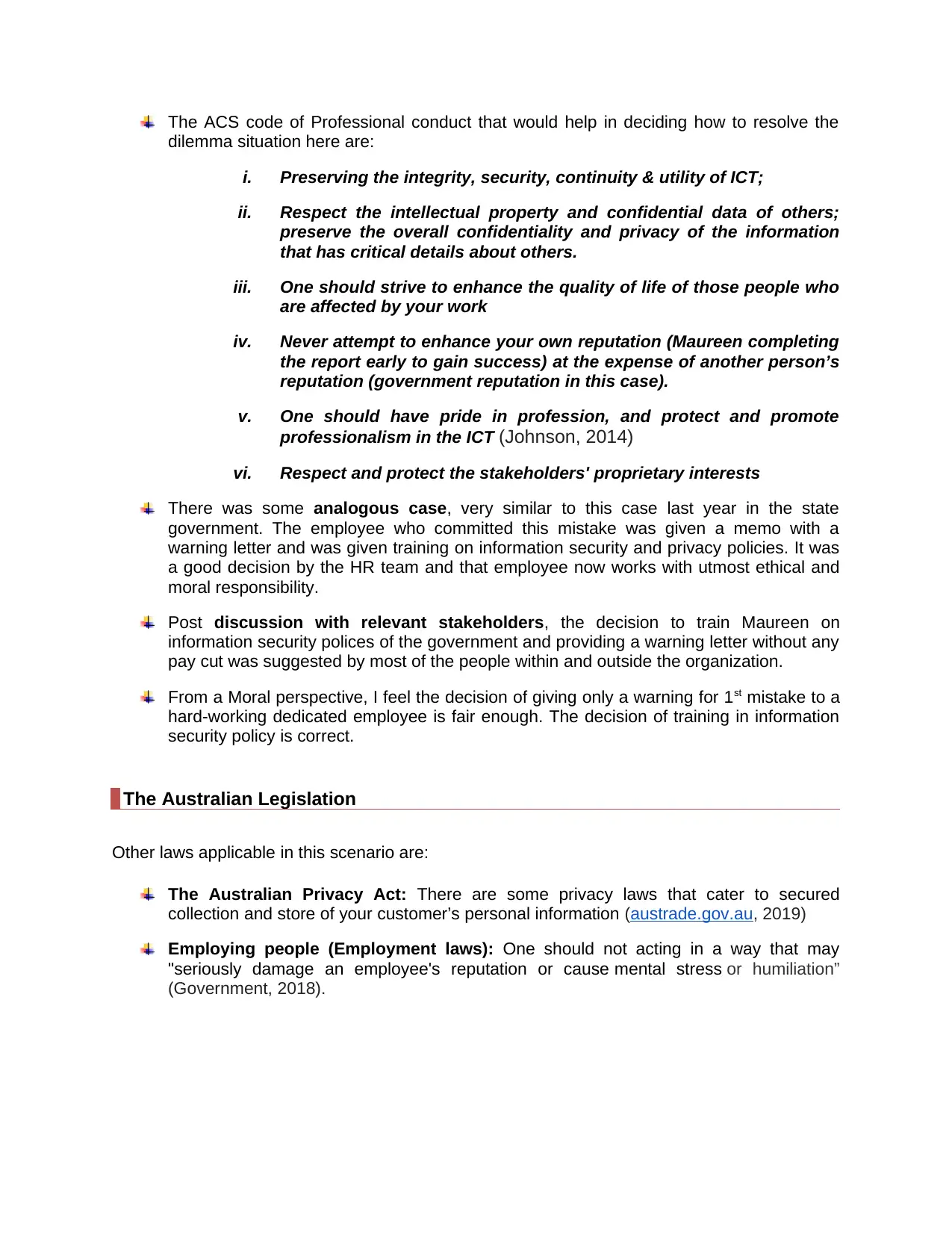
The ACS code of Professional conduct that would help in deciding how to resolve the
dilemma situation here are:
i. Preserving the integrity, security, continuity & utility of ICT;
ii. Respect the intellectual property and confidential data of others;
preserve the overall confidentiality and privacy of the information
that has critical details about others.
iii. One should strive to enhance the quality of life of those people who
are affected by your work
iv. Never attempt to enhance your own reputation (Maureen completing
the report early to gain success) at the expense of another person’s
reputation (government reputation in this case).
v. One should have pride in profession, and protect and promote
professionalism in the ICT (Johnson, 2014)
vi. Respect and protect the stakeholders' proprietary interests
There was some analogous case, very similar to this case last year in the state
government. The employee who committed this mistake was given a memo with a
warning letter and was given training on information security and privacy policies. It was
a good decision by the HR team and that employee now works with utmost ethical and
moral responsibility.
Post discussion with relevant stakeholders, the decision to train Maureen on
information security polices of the government and providing a warning letter without any
pay cut was suggested by most of the people within and outside the organization.
From a Moral perspective, I feel the decision of giving only a warning for 1st mistake to a
hard-working dedicated employee is fair enough. The decision of training in information
security policy is correct.
The Australian Legislation
Other laws applicable in this scenario are:
The Australian Privacy Act: There are some privacy laws that cater to secured
collection and store of your customer’s personal information (austrade.gov.au, 2019)
Employing people (Employment laws): One should not acting in a way that may
"seriously damage an employee's reputation or cause mental stress or humiliation”
(Government, 2018).
dilemma situation here are:
i. Preserving the integrity, security, continuity & utility of ICT;
ii. Respect the intellectual property and confidential data of others;
preserve the overall confidentiality and privacy of the information
that has critical details about others.
iii. One should strive to enhance the quality of life of those people who
are affected by your work
iv. Never attempt to enhance your own reputation (Maureen completing
the report early to gain success) at the expense of another person’s
reputation (government reputation in this case).
v. One should have pride in profession, and protect and promote
professionalism in the ICT (Johnson, 2014)
vi. Respect and protect the stakeholders' proprietary interests
There was some analogous case, very similar to this case last year in the state
government. The employee who committed this mistake was given a memo with a
warning letter and was given training on information security and privacy policies. It was
a good decision by the HR team and that employee now works with utmost ethical and
moral responsibility.
Post discussion with relevant stakeholders, the decision to train Maureen on
information security polices of the government and providing a warning letter without any
pay cut was suggested by most of the people within and outside the organization.
From a Moral perspective, I feel the decision of giving only a warning for 1st mistake to a
hard-working dedicated employee is fair enough. The decision of training in information
security policy is correct.
The Australian Legislation
Other laws applicable in this scenario are:
The Australian Privacy Act: There are some privacy laws that cater to secured
collection and store of your customer’s personal information (austrade.gov.au, 2019)
Employing people (Employment laws): One should not acting in a way that may
"seriously damage an employee's reputation or cause mental stress or humiliation”
(Government, 2018).
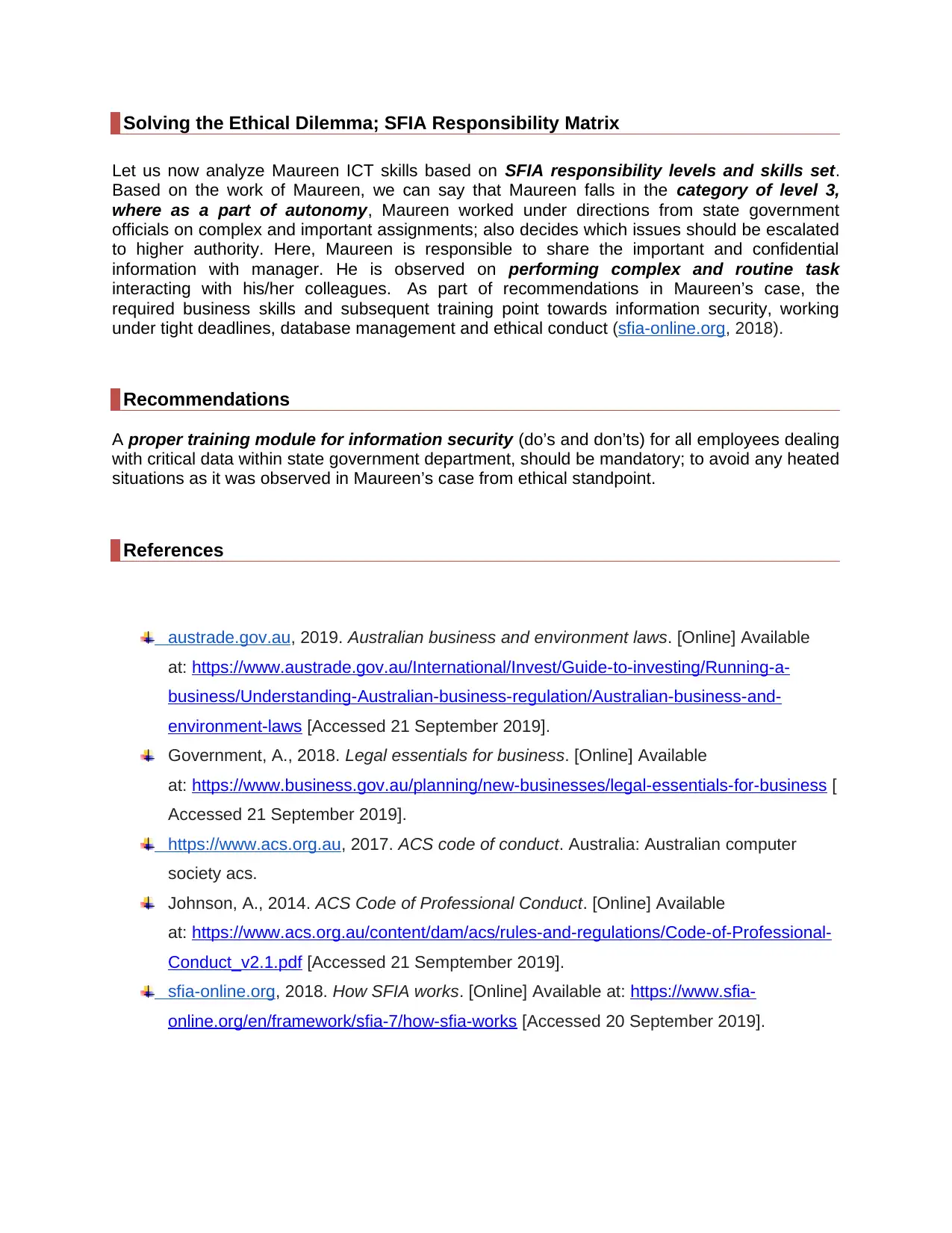
Solving the Ethical Dilemma; SFIA Responsibility Matrix
Let us now analyze Maureen ICT skills based on SFIA responsibility levels and skills set.
Based on the work of Maureen, we can say that Maureen falls in the category of level 3,
where as a part of autonomy, Maureen worked under directions from state government
officials on complex and important assignments; also decides which issues should be escalated
to higher authority. Here, Maureen is responsible to share the important and confidential
information with manager. He is observed on performing complex and routine task
interacting with his/her colleagues. As part of recommendations in Maureen’s case, the
required business skills and subsequent training point towards information security, working
under tight deadlines, database management and ethical conduct (sfia-online.org, 2018).
Recommendations
A proper training module for information security (do’s and don’ts) for all employees dealing
with critical data within state government department, should be mandatory; to avoid any heated
situations as it was observed in Maureen’s case from ethical standpoint.
References
austrade.gov.au, 2019. Australian business and environment laws. [Online] Available
at: https://www.austrade.gov.au/International/Invest/Guide-to-investing/Running-a-
business/Understanding-Australian-business-regulation/Australian-business-and-
environment-laws [Accessed 21 September 2019].
Government, A., 2018. Legal essentials for business. [Online] Available
at: https://www.business.gov.au/planning/new-businesses/legal-essentials-for-business [
Accessed 21 September 2019].
https://www.acs.org.au, 2017. ACS code of conduct. Australia: Australian computer
society acs.
Johnson, A., 2014. ACS Code of Professional Conduct. [Online] Available
at: https://www.acs.org.au/content/dam/acs/rules-and-regulations/Code-of-Professional-
Conduct_v2.1.pdf [Accessed 21 Semptember 2019].
sfia-online.org, 2018. How SFIA works. [Online] Available at: https://www.sfia-
online.org/en/framework/sfia-7/how-sfia-works [Accessed 20 September 2019].
Let us now analyze Maureen ICT skills based on SFIA responsibility levels and skills set.
Based on the work of Maureen, we can say that Maureen falls in the category of level 3,
where as a part of autonomy, Maureen worked under directions from state government
officials on complex and important assignments; also decides which issues should be escalated
to higher authority. Here, Maureen is responsible to share the important and confidential
information with manager. He is observed on performing complex and routine task
interacting with his/her colleagues. As part of recommendations in Maureen’s case, the
required business skills and subsequent training point towards information security, working
under tight deadlines, database management and ethical conduct (sfia-online.org, 2018).
Recommendations
A proper training module for information security (do’s and don’ts) for all employees dealing
with critical data within state government department, should be mandatory; to avoid any heated
situations as it was observed in Maureen’s case from ethical standpoint.
References
austrade.gov.au, 2019. Australian business and environment laws. [Online] Available
at: https://www.austrade.gov.au/International/Invest/Guide-to-investing/Running-a-
business/Understanding-Australian-business-regulation/Australian-business-and-
environment-laws [Accessed 21 September 2019].
Government, A., 2018. Legal essentials for business. [Online] Available
at: https://www.business.gov.au/planning/new-businesses/legal-essentials-for-business [
Accessed 21 September 2019].
https://www.acs.org.au, 2017. ACS code of conduct. Australia: Australian computer
society acs.
Johnson, A., 2014. ACS Code of Professional Conduct. [Online] Available
at: https://www.acs.org.au/content/dam/acs/rules-and-regulations/Code-of-Professional-
Conduct_v2.1.pdf [Accessed 21 Semptember 2019].
sfia-online.org, 2018. How SFIA works. [Online] Available at: https://www.sfia-
online.org/en/framework/sfia-7/how-sfia-works [Accessed 20 September 2019].
Secure Best Marks with AI Grader
Need help grading? Try our AI Grader for instant feedback on your assignments.
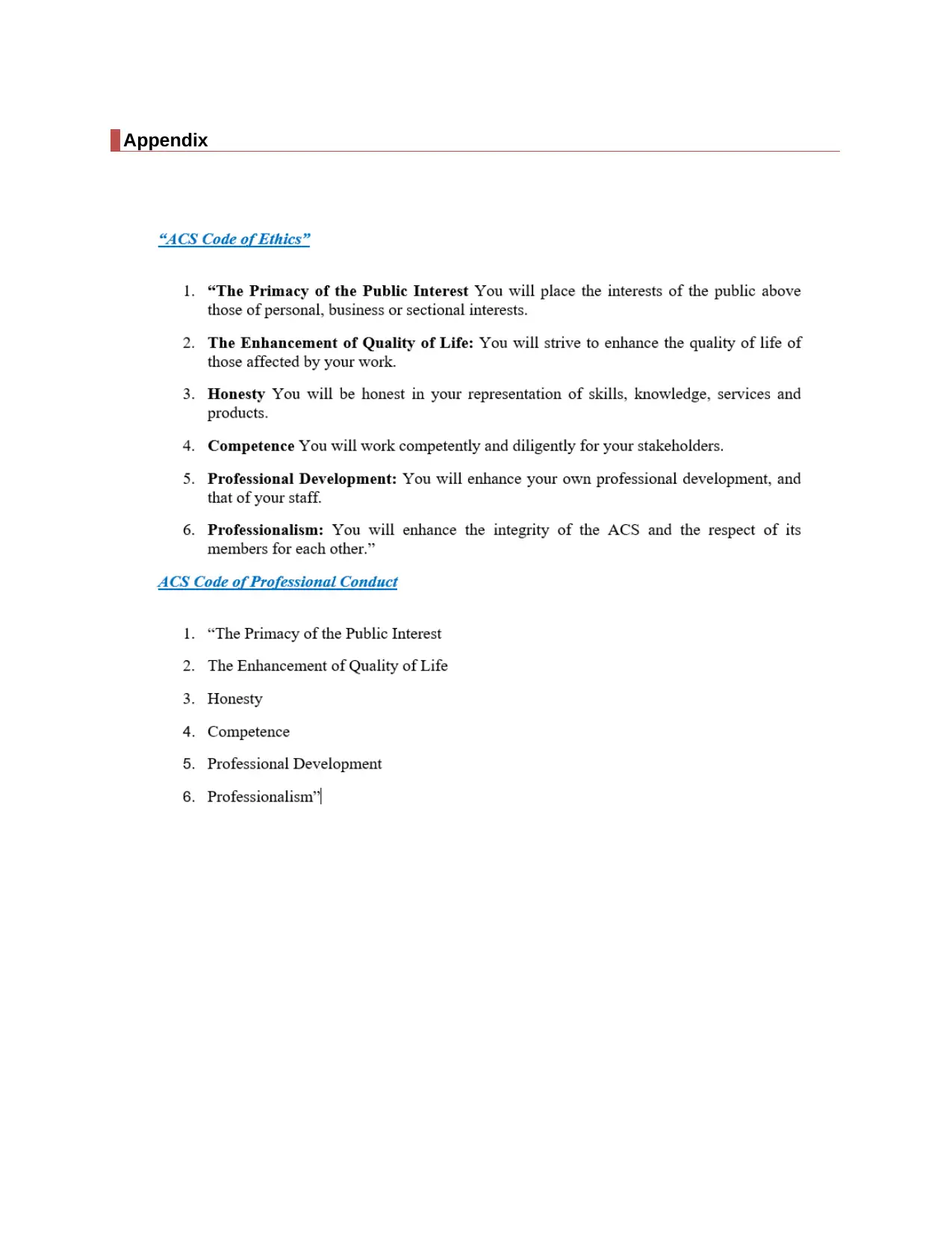
Appendix
1 out of 5
Related Documents
Your All-in-One AI-Powered Toolkit for Academic Success.
+13062052269
info@desklib.com
Available 24*7 on WhatsApp / Email
![[object Object]](/_next/static/media/star-bottom.7253800d.svg)
Unlock your academic potential
© 2024 | Zucol Services PVT LTD | All rights reserved.





